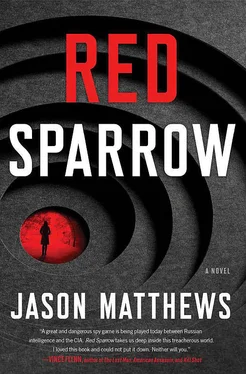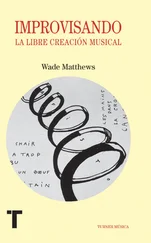“ Bozhe, ” said Vassily, and hurried home to tell his wife.
“This comes from your family,” said Vassily dryly to Nina, as red-faced Dominika would glower when the music was turned off, gravely displeased, eyes ablaze. If she was this way at age five, what would she be like later on?
When at the age of ten Dominika auditioned at the Moscow State Academy of Choreography at second Frunzenskaya 5 she impressed the admissions panel. She had no technique, no formal discipline, but even at that young age they saw in her the intensity, the natural skill, the instincts of a great dancer. They had asked her why she wanted to dance, and had laughed at her answer, “Because I can see the music,” and the room grew still as her already strikingly beautiful face darkened and she regarded the panel through narrowed eyes as if contemplating doing them all physical harm.
Dominika made her saucy, triumphant way through the academy, the great feeder school for the Bolshoi. She flourished despite the rigors of the classical Vaganova method. She had by then become accustomed to living with the colors. Her ability to see them, whether while listening to music, or dancing, or simply talking to people, now felt more refined, somehow more under her control. And she began deciphering the colors, associating them with moods and emotions. It was not a burden. To her it was simply something she lived with.
Dominika continued to excel, but not only in dancing. She achieved highest marks in the academy’s middle and upper schools, where her ability to remember everything she had been taught served her well. This was something new, something different. Dominika listened to the political lectures, the ideological lessons, the history of communism, the rise and fall of the socialist state, the history of Soviet ballet. Of course, there had been excesses, and there had been corrections. And now modern Russia would continue to grow, a sum greater than its parts. Her young mind made the leap, accepted the cant.
By age eighteen, Dominika was promoted to the first student troupe at school and led her study class in political achievement. Each night she would return home to tell her secretly horrified father what she had learned. He tried to counterbalance her growing enthusiasms with the lessons of literature and history. But Dominika was in the full flight of her adolescence, in the grip of her young career. If she sensed the nature of his desperate message, if she read the colors above his head, she gave no sign. Vassily could not be more clear. He dared not speak out openly against the system.
Of course, Nina was pleased that her daughter was progressing so rapidly in the junior ballet company. It was fine, a secure future was assured. But she too watched in dismay as her little girl became a model Modern Russian Woman, an ultranationalist, a tall, chestnut-haired beauty who walked with the elegance of a ballerina, and who behaved like the apparatchiki of the old days.
Dominika lay on the carpet in the living room, her mother combing her dark hair softly, rhythmically, with the long-handled brush that belonged to her great-grandmother. The tortoiseshell brush with gently curved handle that, along with a framed photograph and a silver samovar, was the only family belonging rescued from the elegant house in pre-Bolshevik Petersburg. The hog’s-hair bristles made a quiet stirring sound, crimson in the air. Her hair was radiant. Dominika, stretching after a long day of ballet, interrupted her father’s soft-spoken narrative by relating what she had heard at school. “Father, do you realize that outside influences are threatening the country? Are you aware of the growing number of dissidents advocating chaos ? Have you read V. V. Putin’s article concerning Zionists working against the state?”
With a dull ache, the parents looked down at their daughter. Gospodi pomiluj! God forbid! The state. V. V. Putin. Dissidents . On the floor, Dominika stretched deeply, her long legs and lithe figure already Their instrument, her good mind slowly being brought into Their service. Nina looked at Vassily. She wanted to tell her daughter the truth, to warn her about the pitfalls of the system that had killed her career, of a system that had forced Vassily to blank his exceptional mind and stay silent for his entire life. Vassily shook his head. “Not now, not ever,” he said.
At twenty, Dominika was selected prima ballerina of the First Troupe. Her evaluations uniformly were outstanding and her athletic ability prompted her ballet master to compare her to “a young Galina Ulanova” the prima ballerina assoluta of the Bolshoi after the war. Now, when she danced, the colors she saw no longer were elemental shapes and hues, but sophisticated waves of variegated lights, rolling and pulsing and carrying her aloft. The sepia tones surrounding her dancing partners let her more perfectly combine with them. She was hot to the touch, precise, strong in back and leg, exquisite and tall on her toes. The ballet master insisted it was time she began preparing for the yearly audition to join the Bolshoi troupe.
As she grew stronger and more supple, there was something else coming alive within Dominika’s body, an extension of the rigors of dance, an awareness of her own body. It was not lasciviousness, for she carried her sexuality within her. It was a private awakening, and she tested her corporeal boundaries without a thought of shame. As far as she could determine, neither of her parents was this way, so perhaps a long-forgotten relative had been a libertine.
In her darkened bedroom, when her body called her, she explored her sensations, explored them as intently as she practiced at the barre, her breathing deep red behind her eyelids, and she shuddered as she discovered how she was wired. It was not a fetish, nor an addiction, but rather a secret self that grew more aware as she grew older. She enjoyed her secret self. It was not all nature-child innocence, however. She occasionally felt the need for something edgy, forbidden, and she closed her eyes tight, on a night of a colossal thunderstorm outside her window, amazed at herself, as she held the swan-necked handle of Prababushka ’s brush in her long fingers, timing the lightning flashes to match her own rhythms. Wanting more and more, amazed still, she trailed the humid point lower and held her breath and felt the even sweeter surge of the handle suddenly pinning her like a beetle in a display case. Thank God she had now taken to combing her own hair in the evenings after ballet school.
Though she had casual friends, Dominika was not friendly with her classmates. For all that, she was class leader, concerned and consumed with nothing but the troupe’s progress, its record of excellence, the triumphs in competitions with other schools, especially those from Saint Petersburg, the spiritual center of Russian ballet of the imperial style. Dominika lectured her weary fellow dancers about the Moscow School’s purity, its essential Russian nature. They all called her klikusha, the demoniac, behind her back, the New Russian Woman, the gladiator, the star, the devoted, the true believer. Oh, shut up, they thought.
At twenty-two, Sonya Moroyeva probably had one final year to move up from the academy to the Bolshoi, but with Egorova in the running that year, her chances were not good. She had been dancing all her life, was the daughter of a full member of the Duma, and was at the core a spoiled and vain young woman. She was, frankly, desperate. She had been recklessly sleeping with a boy in the troupe, blond, lynx-eyed Konstantin, an incredibly risky activity that if discovered by the instructors would have guaranteed their instant dismissal from the school. But after fifteen years in the academy she knew the quiet times, and when the sauna room was deserted, and how long they had for their sweaty sessions, with her supple legs bent over her head, and she whispered in Konstantin’s ear for a week, and told him she loved him, and ground her hips up at him, licking the sweat from his face, and begged him to save her career, her life.
Читать дальше












